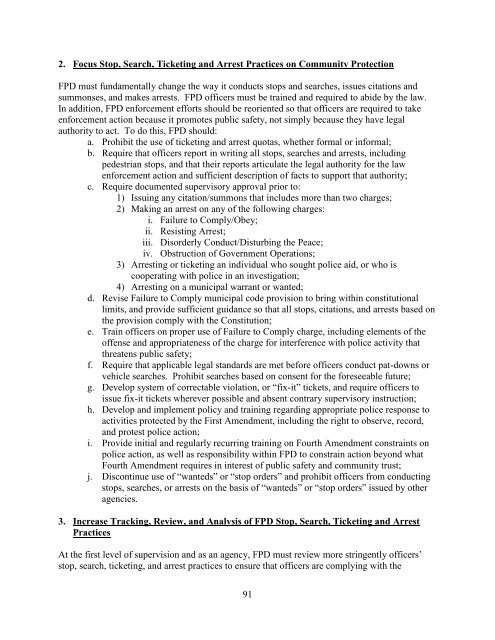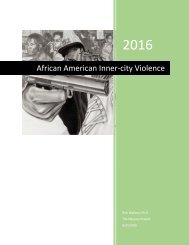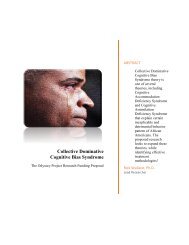U.S. Justice Department Report on the Ferguson Police Department
Ferguson’s law enforcement practices are shaped by the City’s focus on revenue rather than by public safety needs. This emphasis on revenue has compromised the institutional character of Ferguson’s police department, contributing to a pattern of unconstitutional policing, and has also shaped its municipal court, leading to procedures that raise due process concerns and inflict unnecessary harm on members of the Ferguson community.
Ferguson’s law enforcement practices are shaped by the City’s focus on revenue rather than by public safety needs. This emphasis on revenue has compromised the institutional character of Ferguson’s police department, contributing to a pattern of unconstitutional policing, and has also shaped its municipal court, leading to procedures that raise due process concerns and inflict unnecessary harm on members of the Ferguson community.
Create successful ePaper yourself
Turn your PDF publications into a flip-book with our unique Google optimized e-Paper software.
2. Focus Stop, Search, Ticketing and Arrest Practices <strong>on</strong> Community Protecti<strong>on</strong><br />
FPD must fundamentally change <strong>the</strong> way it c<strong>on</strong>ducts stops and searches, issues citati<strong>on</strong>s and<br />
summ<strong>on</strong>ses, and makes arrests. FPD officers must be trained and required to abide by <strong>the</strong> law.<br />
In additi<strong>on</strong>, FPD enforcement efforts should be reoriented so that officers are required to take<br />
enforcement acti<strong>on</strong> because it promotes public safety, not simply because <strong>the</strong>y have legal<br />
authority to act. To do this, FPD should:<br />
a. Prohibit <strong>the</strong> use of ticketing and arrest quotas, whe<strong>the</strong>r formal or informal;<br />
b. Require that officers report in writing all stops, searches and arrests, including<br />
pedestrian stops, and that <strong>the</strong>ir reports articulate <strong>the</strong> legal authority for <strong>the</strong> law<br />
enforcement acti<strong>on</strong> and sufficient descripti<strong>on</strong> of facts to support that authority;<br />
c. Require documented supervisory approval prior to:<br />
1) Issuing any citati<strong>on</strong>/summ<strong>on</strong>s that includes more than two charges;<br />
2) Making an arrest <strong>on</strong> any of <strong>the</strong> following charges:<br />
i. Failure to Comply/Obey;<br />
ii. Resisting Arrest;<br />
iii. Disorderly C<strong>on</strong>duct/Disturbing <strong>the</strong> Peace;<br />
iv. Obstructi<strong>on</strong> of Government Operati<strong>on</strong>s;<br />
3) Arresting or ticketing an individual who sought police aid, or who is<br />
cooperating with police in an investigati<strong>on</strong>;<br />
4) Arresting <strong>on</strong> a municipal warrant or wanted;<br />
d. Revise Failure to Comply municipal code provisi<strong>on</strong> to bring within c<strong>on</strong>stituti<strong>on</strong>al<br />
limits, and provide sufficient guidance so that all stops, citati<strong>on</strong>s, and arrests based <strong>on</strong><br />
<strong>the</strong> provisi<strong>on</strong> comply with <strong>the</strong> C<strong>on</strong>stituti<strong>on</strong>;<br />
e. Train officers <strong>on</strong> proper use of Failure to Comply charge, including elements of <strong>the</strong><br />
offense and appropriateness of <strong>the</strong> charge for interference with police activity that<br />
threatens public safety;<br />
f. Require that applicable legal standards are met before officers c<strong>on</strong>duct pat-downs or<br />
vehicle searches. Prohibit searches based <strong>on</strong> c<strong>on</strong>sent for <strong>the</strong> foreseeable future;<br />
g. Develop system of correctable violati<strong>on</strong>, or “fix-it” tickets, and require officers to<br />
issue fix-it tickets wherever possible and absent c<strong>on</strong>trary supervisory instructi<strong>on</strong>;<br />
h. Develop and implement policy and training regarding appropriate police resp<strong>on</strong>se to<br />
activities protected by <strong>the</strong> First Amendment, including <strong>the</strong> right to observe, record,<br />
and protest police acti<strong>on</strong>;<br />
i. Provide initial and regularly recurring training <strong>on</strong> Fourth Amendment c<strong>on</strong>straints <strong>on</strong><br />
police acti<strong>on</strong>, as well as resp<strong>on</strong>sibility within FPD to c<strong>on</strong>strain acti<strong>on</strong> bey<strong>on</strong>d what<br />
Fourth Amendment requires in interest of public safety and community trust;<br />
j. Disc<strong>on</strong>tinue use of “wanteds” or “stop orders” and prohibit officers from c<strong>on</strong>ducting<br />
stops, searches, or arrests <strong>on</strong> <strong>the</strong> basis of “wanteds” or “stop orders” issued by o<strong>the</strong>r<br />
agencies.<br />
3. Increase Tracking, Review, and Analysis of FPD Stop, Search, Ticketing and Arrest<br />
Practices<br />
At <strong>the</strong> first level of supervisi<strong>on</strong> and as an agency, FPD must review more stringently officers’<br />
stop, search, ticketing, and arrest practices to ensure that officers are complying with <strong>the</strong><br />
91

















